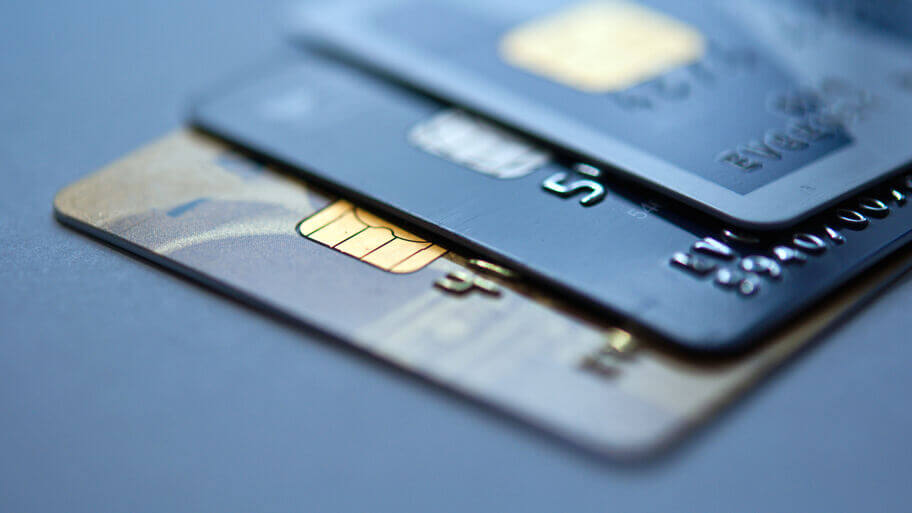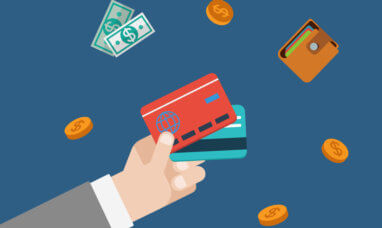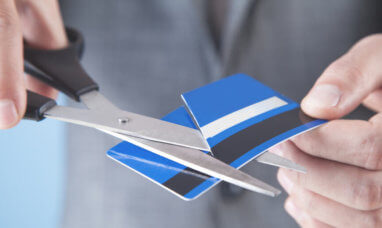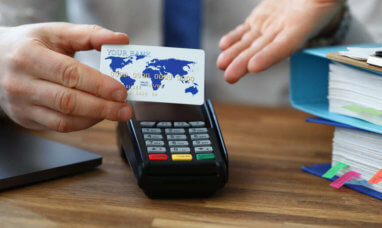Learn about what causes bad credit, and how to find the best credit cards for bad credit here.
What Causes Bad Credit?
There are several factors that determine your credit score. Factors such as your debt load, payment history, and the types of credit available all impact your creditworthiness. Some factors are minor, while others have a serious impact on your score.
Here are the main factors that make up your credit score and how they can cause bad credit.
Payment History
Payment history carries the most weight in determining your credit score. This is why it’s extremely important to pay your bills on time. While it’s okay to pay bills a couple of days late, bills that are more than 30 days late will show up on your credit score. Even a single late payment can have a major dent in your score.
Repeatedly missing payments is even worse, and it can take years for your score to recover.
Amounts You Owe
The amount of debt you have also matters. Credit scoring systems pay close attention to credit utilization, which is the amount of credit that you’re using. The closer you are to using all of your available credit (i.e. maxing out a credit card), the lower your credit score will be.
Having a $150 balance on a card with a $2,000 limit isn’t going to negatively impact your score. But having a $150 balance on a $200 line of credit could raise red flags.
Length of Credit History
The longer you have credit, the higher your score will be. One of the most common mistakes that people make is closing old credit cards or lines of credit because they aren’t using them. However, holding onto these old accounts is extremely valuable for your credit score.
New Credit Applications
Each time you apply for a new line of credit, your score will drop temporarily. Applying for multiple cards within a short timeframe will have a more lasting effect on your score. Only apply for cards that you’re certain you’ll get approved for.
Types of Credit
Variety is the spice of life, even when it comes to your credit score. Scoring formulas give higher scores when there is a mix of different account types, including loans and credit cards.
What’s the Easiest Credit Card to Get Approved For?
There’s no guarantee that you’ll get approved for a credit card. Along with your credit history, issuers also look at your debt-to-income ratio, employment history, and other factors. However, there are some cards that have lower criteria and are easier to get approved for, including:
-
-
- Secured credit cards
- Store credit cards
- Unsecured credit cards
-
Opening a new credit card and practicing good credit habits will give your score a boost. In the future, you’re more likely to qualify for a higher line of credit or a card with a robust rewards program in the future.
The Costs of Bad Credit
Your credit score measures how risky of a borrower you are. A high score indicates that the perceived risk is low. On the other hand, a low credit score indicates a higher level of risk.
Having bad credit greatly limits your borrowing options. If you’re able to get approved for a loan, you’ll be required to pay a higher interest rate to offset the risk. But bad credit comes at other costs as well.
Today, credit scores are often used as a measure of reliability, even though that’s not what they’re intended for. Insurers, employers, landlords, utility companies, and others all look at credit scores when evaluating applicants and customers.
Many people don’t realize that bad credit could:
-
-
- Force them to pay security deposits for utilities
- Prevent them from renting
- Increase their car insurance rates
-
Though it’s a journey, with dedication and wise decisions, it’s possible to improve your credit score. There are many cards that are specifically designed for people with bad credit to get them on the path to building and repairing.
Choosing a Credit Card for Bad Credit
Credit cards meant for people with bad credit often come with high interest rates and low credit limits. A 526 credit score credit card is going to be much different than one for someone with a 780 credit score. Though these credit cards aren’t ideal, remember that the sole purpose of these cards is to help you build or rebuild your credit.
When deciding which card to apply for, here are some things to keep in mind.
-
-
- Low fees – Unsecured credit cards are enticing because they don’t require a deposit. However, these cards charge other fees, including annual fees and maintenance charges, which can easily add up to $100 or more each year. But watch out for credit card red flags like high fees.
-
A secured credit card is the better option for people with bad credit. While you do have to pay a deposit, you can get the money back. Secured cards also typically have no annual fee, or a relatively small one. There are also no hidden charges to worry about.
-
-
- Credit bureau reporting – A card only helps you build credit if payments are reported to the credit bureaus. Choose a card that reports to all three of the major credit bureaus. Be aware that prepaid cards do not impact your credit score.
- Free credit check – Find a card issuer that offers free access to your credit score. This way, you can track your progress to see how your credit and financial decisions impact your score. You’ll also want to find an issuer that offers financial education programs, debt-payment calculators, and other free resources.
- Option to upgrade – As your credit improves, you want the opportunity to upgrade to a card with better terms. Ask the issuer if there’s a path to upgrade and what your options may be in the future.
Best Credit Cards of July 2024
-
How to Apply for a Credit Card for Bad Credit
Now that you know how to choose a credit card for bad credit let’s discuss the application process.
-
-
- Know your credit score. If you have a score of 600 or lower, you won’t get approved for a card that requires good credit. Remember, each application goes on your credit report and will decrease your score. Know where you stand before applying.
- Apply. After finding a card that suits your credit score, the next step is to apply! Most issuers offer online applications that can be filled out in a matter of minutes. You’ll need to provide personal details such as your name, address, phone number, along with your Social Security number. You’ll also be required to report income information.
- Pay the security deposit. If you choose a secured credit card, your account won’t be opened until you pay the security deposit. Depending on the card, you may need to pay $200 to $300. The amount you pay usually determines your credit limit.
- Wait for your card in the mail. After paying the deposit, your account will be active. You should receive your card in the mail within a few days of your application being reviewed and approved.
-
How to Raise Your Credit Score Using a Credit Card
While you can’t fix bad credit overnight, it’s not stuck with you forever. Making smart financial decisions and using your credit card responsibly is one of the fastest, most effective ways to build and repair credit.
-
-
- To increase your credit score:
- Use the card for small transactions
- Make on-time payments and pay in full
- Keep utilization below 30% at all times
- Track your credit progress
- Don’t close any accounts
-
By being consistent and true to your goal, you’ll find that your credit score will be on the mend!
Credit Cards to Avoid
Most credit cards marketed to those with bad credit are expensive. They tend to have steep fees, including application, processing, activation, and monthly membership fees, as well as annual fees.
Some credit cards that you’ll want to avoid include:
-
-
- Horizon Gold Card
- First Premier Bank Credit Card
- Total Visa
- Credit One Bank Credit cards
- Matrix Card (also known as Reflex, Fit, and Cerulean Card)
-
Last Resort Options
If you’re struggling to find a credit card that’s suitable for people with bad credit, consider:
-
-
- Milestone Gold Mastercard
- Indigo Platinum Mastercard
-
We also recommend a Rewards 660 credit card application. This card is designed for people with poor credit who want an unsecured credit card.
Frequently Asked Questions
What Is a Bad Credit Score?
In terms of credit cards, a bad credit score is one that’s below 630 when using the 300 to 850 scale.
I Have Bad Credit – Is a Secured Card My Only Option?
No, a secured card isn’t your only option if you have bad credit. However, it’s usually the best option. Unsecured cards don’t require a cash deposit, but they’re known for having costly fees, which you can’t get back.
Am I Eligible to Apply for a Credit Card for Bad Credit?
To apply for a credit card, you must be 18 years or older and have a Social Security number. In some instances, you’ll need to show that you have income, as well as a bank account.
How to Unblock Your Standard Bank Card?
If your card has been blocked, you’ll need to contact the issuer. You can find this information on the back of the card.
Featured Image: Megapixl








